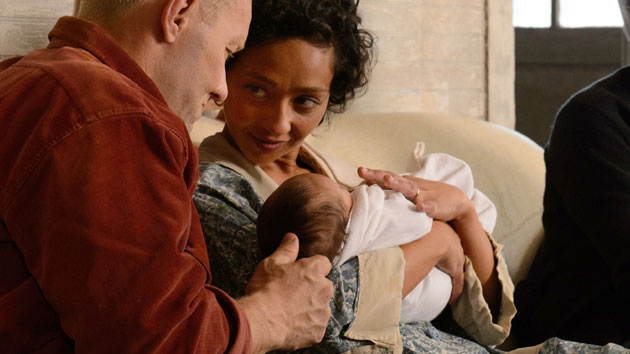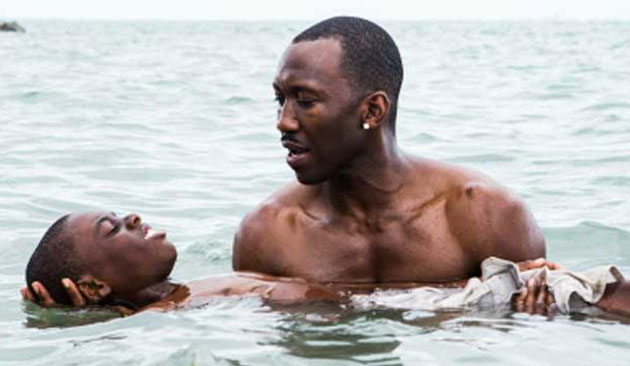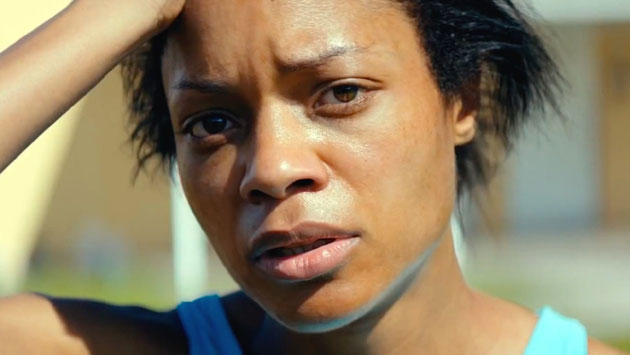|
Throughout history, love has been blighted by the efforts of hierarchies to define it, and to punish those who deviate from their perceived
norm. The results of the last election, at least in minor part, were determined by this. Two notable new films—Jeff Nichols’ Loving and Barry Jenkins’ Moonlight
—explore this theme, the first directly, the second more subtly.
It is appropriately ironic that the title of Loving is taken from its protagonists, both actual historical characters—Richard and
Mildred Loving, played in the film by Joel Edgerton and Ruth Negga. Richard and Mildred, born and raised in the same small enclave in Caroline County, Va., are obviously made
for each other. Richard is a bricklayer, Mildred a farmer’s daughter, and they spend their weekends at hot rod races at which Mildred’s brothers and Richard
compete. Mildred’s pregnancy forces the marriage, but Nichols’ screenplay makes plain that they would have married anyway.
There’s just one problem. Richard is white, Mildred is black, and the year is 1958. Virginia and 15 other states had
anti-miscegenation laws in force—Virginia’s dated from 1691—and those who enforced those laws believed they were doing the work of God and the Founding
Fathers. This is certainly the attitude of Sheriff Brooks (Marton Csokas), who breaks into their house in the middle of the night to arrest them, and of unsympathetic Judge
Bazile (David Jensen). The best the Lovings’ attorney (Bill Camp) can do for them is a sentence of one year in jail apiece, suspended on condition that they leave the
state for 25 years.
Essentially, Loving is the story of the humiliation and exile of Richard and Mildred—for years they were forced to live in
Washington, D.C., and had to resort to subterfuge simply to see their extended families—until one day Mildred sees a civil rights demonstration on TV and gets the idea to
write to Attorney General Robert Kennedy. Kennedy referred the issue to the American Civil Liberties Union, and the resulting lawsuit, Loving v. Virginia, led to a
landmark Supreme Court ruling in 1967 declaring it unconstitutional to outlaw interracial marriage.
Nichols deliberately sidesteps the courtroom arguments in favor of portraying the daily lives of Richard and Mildred, whose devotion to each
other survives the efforts of officialdom to stamp it out. Some critics have condemned Nichols’ choice, but I disagree. His approach may downplay the historical
significance of Loving v. Virginia, but it emphasizes the humanity and decency of the Lovings themselves. Why did the government of the Commonwealth of Virginia think
it had both the right and the duty to persecute Richard and Mildred Loving? That is the overriding question, and it is questions such as that which underlie every act of
injustice ever committed.

Loving is an unusually muted film for Nichols, whose previous works have been brilliant in a hallucinatory way (Take Shelter,
Midnight Special). It is the story of the Lovings, up close and personal, and the actors who play them make that story
powerfully moving. Edgerton, his crew cut emphasizing the odd angles of his face, gives a superb portrayal of a man determined
to do right by the woman he loves, no matter what. Negga, whose kind eyes and delicate features do not mask the steel
underneath, is even better. One of the best scenes in the film shows Mildred, still in her robe and slippers, alone in a jail cell
because Sheriff Brooks will not allow Richard to post bail for her. Negga’s unostentatious portrayal of despair would make stones weep.
Acknowledging the excellence of Edgerton and Negga, I still must note that Edgerton is Australian and Negga is Irish. Were
there no American actors who could have played these quintessentially American roles? Nevertheless, having seen the
film, I cannot imagine any other actors in the roles of Richard and Mildred, and that is justification enough.
Loving begins as it ends, with Richard measuring the space for the house he plans to build for himself and Mildred. Nine years
have elapsed between those measurements. We are left to ponder the lingering evil that caused the delay.
Loving is a fine film, but Moonlight—which came out of nowhere
to win virtually every critics’ award in sight—is something else again. The film—written and directed by Jenkins from a semi
-autobiographical story by Terell Alvin McCraney—isn’t quite like anything I’ve seen before. It bears a slight resemblance to Beasts of the Southern Wild, Benh Zeitlin’s debut film of a few
years back,and I discern some grace notes from Truffaut. But its sensibility is unique. Moonlight is as close as feature films ever get to lyric poetry.
Moonlight is a film in three sections about the life of a young black man, played by Alex Hibbert in the first section, Ashton
Sanders in the second, and Trevante Rhodes in the third. The young man’s name is Chiron, and each section has as its title the
name he is known by at different stages in his life.
The first section, “Little,” portrays Chiron at the age of ten, living
in the impoverished Liberty City section of Miami. He is known as Little because he is undersized and, in the opinion of his
classmates, insignificant. Quiet and reserved, Little has only one friend, Kevin (Jaden Piner). Little’s other classmates live to beat
up on him, and one day when they are chasing him Little hides in an abandoned motel. The motel turns out to be the safe house for Juan (House of Cards’ Mahershala Ali), a local drug dealer.

Juan, discovering Little, feels sorry for him and takes a liking to him. He and his girlfriend Teresa (Janelle Monae) try to give
Little some semblance of a normal life, and Juan becomes a surrogate father to the boy. However, Juan has a secret: he is
dealing to Paula (Naomie Harris), Little’s neglectful addict mother.
In the second section, Chiron is now known by his Christian name, and is a teenager of about 15. He is still living in Liberty
City and still friends with Kevin (now played by Jharrel Jerome), but a gang of bullies led by Terrel (Patrick Decile) makes his
school life hell. Even so, school life is preferable to his home life. Paula, now a full-blown crack addict, views her son strictly as an
ATM and goes ballistic if he even so much as hesitates to give her money. At school, he has Kevin, who in the course of the year
becomes more than a friend. However, Terrel—whose own sexuality is ambiguous—drives Chiron and Kevin apart, and the segment ends violently.
In the third section, Chiron—now called Black, a nickname Kevin
gave him years before—is about 25. He is still a quiet loner, but he has become a prison-hardened drug dealer. Black is now
living in Atlanta, mostly to be close to his mother’s rehab center. Paula, now an emotionally fragile, recovering addict, is
genuinely sorry for the way she treated Black, but knows her actions are unforgivable.
Then, one evening, Black gets a call from Kevin, whom he has not seen in a decade. Kevin, now played by Andre Holland, is
still in Miami, working as a cook, and invites Black to visit. What happens after that, I will leave to you to discover.
Moonlight touches on many themes presented in “message” movies—poverty, racism, drug addiction, the sorrows of growing
up gay—but stubbornly remains the poignant and idiosyncratic portrait of one tortured soul. In a way, it is a rebuke to white
suburbanites such as me, who would cross the street to avoid the grown-up Black and never see the gentle, suffering spirit
inside him. The hallmark of the movie, however, is its universality. Everyone, in some way or other, can relate to
Chiron’s lonely quest for love and belonging, and be moved by it.

Jenkins collaborates wonderfully with his cinematographer, James Laxton, who has won awards for his work in Moonlight. Laxton’s melting images are the perfect expression of Chiron’s
longing; one of the most powerful scenes in the movie is the image of Chiron’s clenched fist in the sand. Mahershala Ali and
Naomie Harris have also won awards for their performances, and deserved them. Ali presents the plight of a decent man who
can only make a living in a way he knows is wrong; Harris, the plight of a woman whose being is taken over by poison. I would
add further commendations for Trevante Rhodes and Andre Holland, whose final scene together is one of the most heartwrenching I have seen in any movie.
I have already reported on seeing two certifiable masterpieces this year: Atom Egoyan’s Remember and David Mackenzie’s Hell
or High Water. Moonlight is the third, and it may be the best of the three. Moonlight, along with Loving, makes an impassioned
plea for people to be allowed to love whomever they please. I fear it is not a message that will gain much sympathy in the new administration.
|